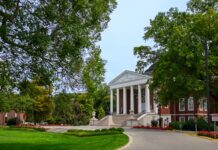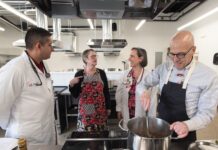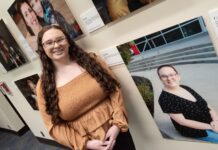
In January, Jabani Bennett began her service as the first Black director of the UofL Women’s Center. Before joining the center, Bennett shaped and provided oversight for numerous creative and inclusive learning and engagement programs for learners across their lifespans. Her career as an award-winning arts educator in New York City and Louisville public schools informs current projects in social justice, cultural equity planning and empowering self-identifies femmes and feminine-presenting women through the arts. As a graduate of UofL with a degree in leadership, Bennett brings a unique perspective to her new role as director. UofL News caught up with Bennett to learn about the center’s efforts to build community on and off campus aimed at affirming connections among students, faculty and staff invested in gender equity.
UofL News: Tell us more about your background – where are you from?
Bennett: I was born and raised in the West End of Louisville in the Shawnee neighborhood. As a child, my parents exposed me to numerous community arts programs in Louisville so you would find me dancing, singing and drawing all the time. Access to spaces of creativity and innovation nurtured my confidence and curiosity about the world. I grew up around a lot of grassroots activists, artists and scholars in our city – including the late Anne Braden, a renowned activist. My mother, Bani Hines-Hudson, worked in community development most of my life and integrated her training in sociology to positively engage children and families in the city’s housing projects through arts and cultural programming. In the 1990s, I remember watching her lead talent shows and community yoga classes as spaces of healing and joy. She exposed me to different women-led groups in Louisville and other major cities that centered Black feminist approaches as tools for structural change.
The life’s work of my father and stepfather cultivated my desire to build coalitions with diverse folks invested in transformative justice. My stepfather was the late J. Blaine Hudson, a civil rights activist, educator and the dean of UofL’s College of Arts & Sciences. My father, James Bennett, is a self-taught visual artist, and community photographer who has captured more than 40 years of Louisville’s history. My parents co-created a village of like-minded folks around me who cared about social justice, the future of our city and my well-being.
UofL News: How was your time outside of Louisville and what does it mean for you to come back to Louisville?
Bennett: As a formally trained visual artist, I always wanted to live in New York City where I felt I had access to numerous spaces of belonging for Black and Brown creatives. In the social geography of New York City, I met so many confident Black and Brown artists. I have so many fond memories of “just being” in community with other dancers, urban farmers, filmmakers, singers and visual artists. Growing up in Louisville, I did not feel that I had access to fun spaces to hang out collectively with other artists. I felt weird and out of place many times in majority white and highly resourced art spaces. Connecting with people who look like me and invested in the joy of art making was important.
When I came back in 2018, I saw that Louisville changed greatly. The first thing that I noticed was how many Black women wear natural hairstyles like afros with pride and listen to global music. I was like “WOW, Louisville!” It was cool to see the cultural shifts in Louisville that positively connected to diverse practices of care found all over the world. The other thing I noticed was the gentrification that is happening in the West End similar to what I experienced in New York City after years of disinvestment, and it was a shocker. Witnessing forced displacement in my hometown hit hard.
UofL News: What does it mean to be the director of the Women’s Center?
Bennett: I am very grateful for the opportunity to co-create an affirming community centered on the dreams and needs of women, femmes and nonbinary folks. I’m honored to be a part of the lineage of women directors like the founder, Judi Jennings, who has worked tirelessly to empower femmes through cultural programming, political education and community building. I have greatly enjoyed my conversations with her. Through delightful storytelling, Judi shared her life’s journey and the history of UofL’s Women’s Center. I have also worked with past directors, Mary Karen Powers and Valerie Casey, as the Women’s Center student events coordinator while I was in graduate school. We are in deep appreciation for the collective efforts of our former directors, staff members, donors and supporters for nurturing enriching experiences for women on campus for the past 30 years.
This position is an ideal place to integrate all the fantastic experiences I had in the arts scenes, public education and activist circles in Louisville and NYC as a queer Black woman artist-researcher invested in an equitable future in my hometown. Through strategic planning and visionary processes, I hope we can co-create a sustainable space of belonging and resource-sharing at the Women Center – a site on campus for fun, community and life-long learning.
UofL News: What is the first big project you are working on after being named director?
Bennett: The first major event in my new role is the 30th anniversary of the Women’s Center on Tuesday, March 21st at 6 p.m. We are coming together to celebrate our “herstory” and our future by recognizing past directors and community leaders invested in gender equity. One of our goals is to elevate an intersectional feminist and antiracist framework to celebrate the contributions of women, femmes and nonbinary folks on and off campus. Through our community engagement, coaching, leadership development and cultural programming, we aim to support success for students, faculty, and staff at the University of Louisville. Not an easy task but through intentional collaboration, I believe deeply that we can do it. History shows healthy collectives build out strong futures, families and neighborhoods. Scarcity mindset is not the way. So that’s the plan!
UofL News: What type of leader are you?
Bennett: I have a doctorate in leadership studies; I am always examining the different leadership approaches that people take in Louisville and around the world. I will never be a “perfect leader,” but I aim to create brave spaces for authentic feedback in my work to support cultural responsiveness, adaptation, vulnerability and pleasurable community practices. As a systems-thinker, I know that power, privilege and diverse perspectives are always present. How can we make sure that students, staff and faculty members feel seen and heard? As a longtime educator – I am curious about processes that breakdown large concepts for learning and innovation. The goal of co-creating places of belonging at UofL is a big concept that involves asset-mapping, reflective practices and reimaging systems. Through shared leadership approaches, I am committed to discovering best practices with others. Collaboration is key. UofL’s Cultural & Equity Center is the best place for me. Working alongside the Cultural Center (the Hispanic, Latinx and Indigenous Initiative & the Black Male Initiative), Muhammad Ali Institute for Peace & Justice and the LGBT Center under the transformational leadership of Marian Vasser, the new assistant vice president for inclusive excellence and belonging, and Leondra Gully, our executive director, I am so excited! What a team!
UofL News: What do you like to do in your spare time?
Bennett: I enjoy spending time with my little girl, Ananda, who is an artist, writer and performer. I love the way she thinks about the world. She is truly an interesting and thoughtful person. You can also find me at cultural events around town with my beloved sister, Nubia Bennett, who also works in the field of leadership development at Leadership Louisville during the day and is a barista at night at Trouble Bar – an amazing bar. Outside of work, I love supporting programming that nurtures the Louisville’s arts community of Black, Brown and low-income creatives. I am also a jazz vocalist so if you are down to create some music – I will jump in line because it is so much fun making sound art! Also, everyone knows I love, love, love to dance, especially movements from different traditions in the African diaspora. Put on some bachata, samba no pe, kizomba, salsa or drumming music – my feet and hips will lead me away. I am also following in the legacy of my mother as a certified yoga teacher invested in trauma-sensitive and accessible yoga practices. I enjoy integrating the ancient practices from India and Africa in my life that have words, concepts, and philosophies that I will never understand completely. So as a recovering perfectionist – I must be very free and open to all of that!
After experiencing great loneliness in the pandemic as a doctorate student, full-time public-school teacher and homeschooling mother, I am ready to nurture community and deep friendships. It is courageous inner work, but I will do it with the support of my ancestors, loved ones and Mama Earth.
UofL News: What advice do you have for students when they feel overstressed?
Bennett: What really matters is being present even if it’s uncomfortable. I have discovered that being present is the unique work required of being human on this Earth for a short time of 100 years or less. Life is uncomfortable, the ups and downs, the nuances and mystery; your journey will ebb and flow until your last breath. Just try your best. It’s okay if you did not receive an A on your test – you can try again with more academic, mental and spiritual support. You truly have supporters here at UofL, our city and global community who are invested in your growth and development. Find your people. We are here. My sister always says, “Pleasure is your right.” The future of work and the multifaceted challenges faced by our planet demands all of us to better understand ourselves and each other. Believe in your story, your preciousness and your gifts to bring innovative insights to us all that only you can share. I am using these same recommendations in my own life – especially building a community of care that nurtures me and keeps me accountable through lovingkindness. The Women’s Center offers many opportunities to build community and make impactful connections with folks who might feel very alone. For that, I will forever be grateful.































